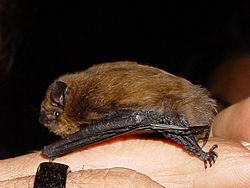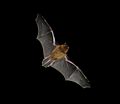Common pipistrelle facts for kids
Quick facts for kids Common pipistrelle |
|
|---|---|
 |
|
| Conservation status | |
| Scientific classification | |
| Kingdom: | |
| Class: | |
| Order: | |
| Suborder: | |
| Family: | |
| Genus: |
Pipistrellus
|
| Binomial name | |
| Pipistrellus pipistrellus |
|
The common pipistrelle (Pipistrellus pipistrellus) is a small pipistrelle bat whose very large range extends across most of Europe, North Africa, southwestern Asia, and possibly into Korea. It is one of the most common bat species in the British Isles.
In 1999, the common pipistrelle was split into two species on the basis of different-frequency echolocation calls. The common pipistrelle uses a call of 45 kHz, while the soprano pipistrelle echolocates at 55 kHz. Since the two species were distinguished, a number of other differences, in appearance, habitat and food, have also been discovered.
Contents
Description
The common pipistrelle is the smallest bat found in Europe. It is 3.5–5.2 cm (1.4–2.0 in) long along the head-and-body, with the tail adding 2.3–3.6 cm (0.91–1.42 in). The body mass can range from 3.5 to 8.5 g (0.12 to 0.30 oz), with the wingspan ranging from 18 to 25 cm (7.1 to 9.8 in). Its brown fur is variable in tone. It is common in woodland and farmland but is also found in towns, where the females roost in lofts and buildings when rearing young.
Echolocation
The frequencies used by this bat species for echolocation lie between 45 and 76 kHz, have most energy at 47 kHz and have an average duration of 5.6 ms.
Images for kids
See also
 In Spanish: Murciélago común para niños
In Spanish: Murciélago común para niños




